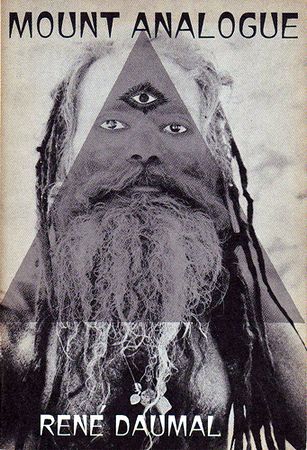 If my head is a hotel, this book is a guest that stayed overnight, and left its wallet behind. It’s a tiny volume that can be read in about half an hour, but when you’re done, you’re left with a maddening sense of being entangled in unfinished business.
If my head is a hotel, this book is a guest that stayed overnight, and left its wallet behind. It’s a tiny volume that can be read in about half an hour, but when you’re done, you’re left with a maddening sense of being entangled in unfinished business.
It’s about a group of metaphysically-minded mountaineers who, noting that mountains so often appear in metaphors, myths, and thought experiments, believe that there is an actual “Mount Analogue” somewhere on the globe…a literal metaphor, paradoxical though that sounds. They set out on a journey to find this hypothetical mountain, and in a far off non-Euclidean land, they succeed.
The book ends with them beginning to climb the mountain’s slope. The author died before he could finish the book, leaving the reader forever stranded at the foothills of what seems like an epiphany. If you want a comparison, this book reminds me of the third part of Gulliver’s Travels, the part few remember yet is in some ways the most thoughtful section of the book. It’s not really action-driven, and although it contains lots of interesting spectacles, it’s implicitly concerned with what’s happening inside the onlooker’s head.
For a book with its head in the clouds, Mount Analogue’s characters are often preoccupied with practical matters, such as bartering for supplies in foreign countries, and setting up outposts in case the quest takes longer than expected. Some of the mountaineers forsake their quest and return home – an enjoyable touch. Where’s the excitement in climbing a mountain if just anyone can do it?
But it’s also fantastic, involving humans made of negative space, and “peradams”: strange gemstones that can only be found by people truly in need of them. Again the Gulliver’s Travels comparisons come out, because he does not let the main thrust of the story distract him from interesting philosophical and moral asides. If he’d left these out, he might have successfully completed the book before his death. But it might also have been a poorer book, a less stimulating book.
Daumal’s wit and writing might be knee-slappingly Gallic (“A knife is neither true nor false, but anyone impaled on its blade is in error.”), but I think Mount Analogue also of course the “Time between Times” marking the demarcations of night and dawn. What’s a mountain except the space between heaven and earth? Or in this story’s case, the space between reality and metaphor?
I am interested to learn where Daumal was going with all this. Due to his death, I will never know. Mount Analogue is a rare thing – a great book that I’m not sure that you should read.
No Comments »
Comments are moderated and may take up to 24 hours to appear.
No comments yet.
